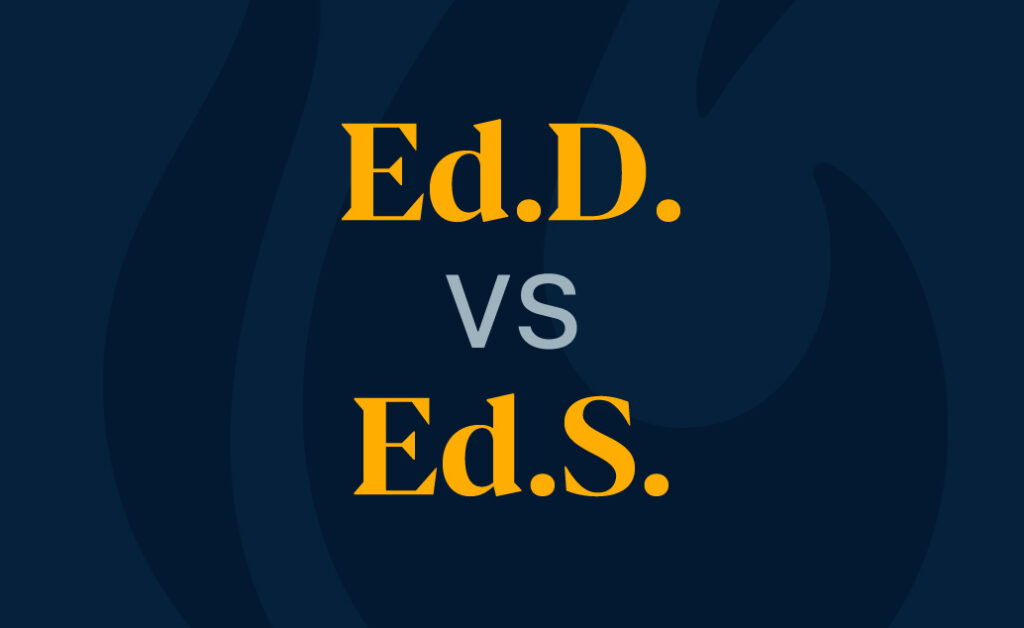
Are you a professional interested in advancing your career and furthering your education beyond a master’s degree? If so, a doctor of education (Ed.D.) or an education specialist (Ed.S.) degree may be a great option for you.
While the Ed.D. and Ed.S. are advanced degrees in the field of education, key differences exist. Choosing between these degree options is a highly personal decision that will likely depend on your career goals. This article will provide an overview of both degrees, including a breakdown of the similarities and differences between the intent and requirements for each degree.
What Is an Ed.D.?
An Ed.D. is a terminal degree focused on the practice of education. It prepares graduates for leadership roles in educational settings, such as school superintendent, college president, principal, chief learning officer and other administrative positions.
Essentially, the Ed.D. is a doctoral program designed for professionals who aspire to the highest leadership roles in schools and other educational settings. Ed.D. programs usually include coursework on educational leadership, policy and research. In addition, Ed.D. degrees typically require a dissertation and can commonly be completed in two to three years.
Ed.D. degrees are similar to doctor of philosophy (Ph.D.) degrees in that both are considered doctorates and terminal degrees. However, Ph.D. programs are more heavily focused on research and theory. Therefore, someone who pursues a Ph.D. in Education would likely desire roles related to researching and teaching education. Someone with an Ed.D., on the other hand, would take the career path of an educational leader putting theory and research into action.
You can learn more about Ed.D. vs. Ph.D. degrees here.
What Is an Ed.S.?
An Ed.S. degree is a postgraduate degree unique to the field of education. While it is not a doctorate in education, the Ed.S. is considered more advanced than a master’s degree and is designed for educators who want to gain specialized skills and knowledge in a particular area, such as leadership, early childhood education, instructional technology, special education, second language instruction, and curriculum and instruction.
Unlike the Ed.D., the Ed.S. does not require a dissertation and typically takes one to two years to complete. An Ed.S. can lead to specialized roles such as curriculum specialist, instructional designer, education consultant and assistant principal.

Who Should Choose an Ed.S. Degree?
If you want to qualify for a leadership role in education, enhance your credentials and salary, or become specialized in your field, an education specialist degree can help you achieve these goals. There are a handful of primary reasons that pursuing an Ed.S. degree might be more appealing compared to an Ed.D. degree:
- Cost and time – The Ed.S. requires less money and time than pursuing an Ed.D.
- No dissertation – The Ed.S. degree does not require a dissertation, which may be appealing if you prefer not to engage in an extensive research study.
- Career goals – If your goal is to gain specialized skills for a specific role, such as an instructional designer or curriculum specialist, then an Ed.S. might be as beneficial as an Ed.D.
- Immediate application – The Ed.S. is designed for practical application in educational settings and is often beneficial for individuals seeking to advance in their careers quickly.
- Stepping stone – The Ed.S. degree can also serve as a stepping stone toward obtaining an Ed.D., as many of the credit hours earned in an Ed.S. degree may be transferrable to an Ed.D. program in the same discipline.
- Career advancement – The Ed.S. degree provides an opportunity to become more proficient in your field while advancing your career and enhancing your credentials.
Who Should Choose an Ed.D. Degree?
Similarly, there are several reasons why pursuing an Ed.D. might be more beneficial than pursuing an Ed.S. degree:
- Higher leadership roles – The Ed.D. generally prepares students for higher-level leadership roles within school districts or other educational institutions, such as school superintendent, chief learning officer or college president. Most education administrators have Ed.D. degrees.
- Career flexibility – The Ed.D. may open the door to a broader range of career possibilities than the Ed.S. degree.
- Broader impact – With an Ed.D., you may be able to make a broader impact in the education field through roles in administration and policymaking.
- Research possibilities – An Ed.D. involves conducting research (typically a dissertation), which can help you address real-world problems in education and contribute to the body of knowledge in the field.
- Doctoral scholarships and funding – Pursuing an Ed.D. might make you eligible for scholarships and other funding opportunities unavailable for students pursuing their Ed.S.
- Prestige and recognition – Unlike the Ed.S., the Ed.D. does confer the title of “Dr.” Thus, you can use the title “Dr.” in front of your name upon graduation.
What About Pay?
The expected earnings for individuals with an Ed.D. and an Ed.S. can vary based on several factors, including career path and experience level. While both degrees can lead to highly competitive salaries, in general, the Ed.D. offers higher earning potential. According to the Bureau of Labor Statistics, individuals who earn a doctoral degree in education have relatively high earnings and low unemployment rates. In 2023, doctoral degree holders achieved median weekly earnings of $2,109 and a 1.2% unemployment rate.
Is an Ed.D. or an Ed.S. a Better Option for Me?
Both the Ed.D. and the Ed.S. are wonderful graduate-level education degree options for professionals seeking to advance their careers. Choosing between an Ed.D. and an Ed.S. degree ultimately depends on several factors, including your career goals, the impact you aim to have, and your interest in research and leadership.
For professionals with a master’s degree, an Ed.S. may be an effective way to reach the next level of professional advancement without completing a doctoral degree. Ed.D. programs are recognized for providing a highly impactful and comprehensive educational experience for those interested in earning their doctoral degree.
At a Glance: Ed.D. vs. Ed.S.
| Doctor of Education (Ed.D.) | Education Specialist (Ed.S.) | |
| Degree Level | Doctoral degree | Specialist degree |
| Focus | Emphasis on leadership, policy and applied research | Emphasis on advanced practice and specialized skills |
| Typical Duration | Two to three years | One to two years |
| Cost | Typically higher | Typically lower |
| Terminal Degree | Yes | No |
FAQs About Ed.D. vs. Ed.S.
Which degree is more advanced?
The Ed.D. is considered the more advanced degree since it is a terminal degree and at the doctoral-level. The Ed.S. is considered a post-master’s degree.
Can I become a school principal with an Ed.S.?
Yes, many school districts accept an Ed.S. for principalship and other administrative roles.
What is the difference between Ed.S. and Ed.D. degrees?
An Ed.S. focuses on specialized skills and advanced practice of a specific role within education. An Ed.D. has an emphasize on broader leadership and policy positions.
Is an Ed.D. considered a doctorate?
Yes, an Ed.D. is a doctoral degree aimed at professionals in the education sector. It is typically a common doctorate for education administrators to have.
Can I earn an Ed.S. and then pursue an Ed.D.?
Yes, you can earn an Ed.S. first, then apply your credit hours towards an Ed.D. program if you decide to pursue further education.
American College of Education offers high-quality, fully online Ed.D. and Ed.S. programs that can help you reach your career goals. With Ed.D. degrees under $24,000* and Ed.S. degrees under $13,000,* our affordable and flexible programs can make your educational dreams a reality.
*All values shown are an estimated value of the cost of tuition and fees. Actual amounts may vary depending on the number of transfer credits applied to the selected program hours, the pace and satisfactory completion of the selected program, the receipt of scholarship or grant amounts, or adjustments to tuition or fees as described in the Catalog Right to Modify Tuition section. State sales and use tax will apply where required by law.

